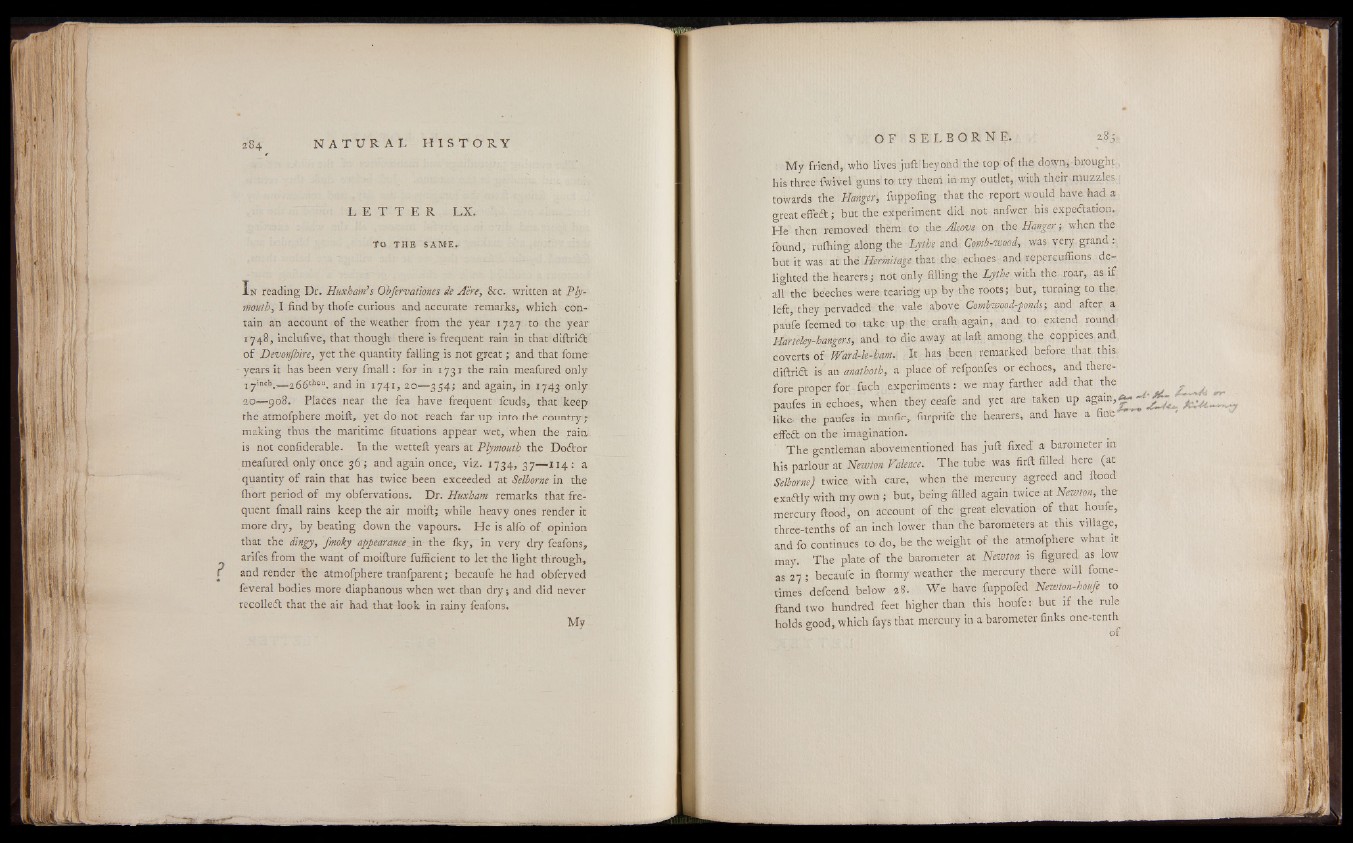
illS
l i l l iMèl i ,
*84 N A T U R A L H I S T O R Y
L E T T E R LX.
TO TH E S A M E .
' §1
iI lMllfifl l|
II
I n reading Dr. Huxham’s Ob/eruationes de Aere, &c. written at Plymouth,
I find by thofe curious and accurate remarks, which contain
an account of the weather from the year 1727 to the year
1748, inclufive, that though there is frequent rain in that diftridt
of DevonJhire, yet the quantity falling is not great; and that fome
- years it has been very fmall: for in 1731 the rain meafured only
17'nch.— 266th0". and in 1741, 20— 354; and again, in 1743 only
20— 908. Places near the fea have frequent feuds, that keep
the atmofphere moift, yet do not reach far up into the country;
making thus the maritime fituations appear wet, when the rain,
is not confiderable. In the wetted years at Plymouth the Dodlor
meafured only once 36 ; and again once, viz. 1734, 37— n 4 : a
quantity of rain that has twice been exceeded at Selborne in the
fhort period of my obfervations. Dr. Huxham remarks that frequent
fmall rains keep the air moift; while heavy ones render it
more dry, by beating down the vapours. He is alfo of opinion
that the dingy, fmoky appearance in the fky, in very dry feafons,
arifes from the want of moifture fufficient to let the light through,
and render the atmofphere tranfparent; becaufe he had obferved
feveral bodies more diaphanous when wet than dry; and did never
recoiled; that the air had that look in rainy feafons.
My
O F S E L B O R N E . 283.
My friend, who lives juft'beyond the top of the down,-brought ,
his three’ fwivel guns to try them in my oudet, with their muzzles
towards the Hanger, fuppofing that the report would have had a
great effedt; but the experiment did not anfwer his expedation..
He then removed them to the Alcove on the Hanger; when the
found, rufhing along the lyihe and Comb-wood, was very grand
but it was at thé Hermitage that the. echoes. and repercuflions delighted
the hearers; not only filling the Lythe with the. roar, as if
all the beeches were tearing up by the roots; but, turning to the.
they pervaded the vale above Combwood-ponds, and after a
paufe feemed to take up the' cralh again, and to extend round
Harteley-hangers, and to die away atlaft.among the coppicesand,
coverts of Ward-le-ham. It has been remarked before that this
diftrid is an anathoth, a place of refponfes or echoes, and therefore
proper for fuch experiments: we may farther add that the ^ ^
paufes in echoes, when they ceafe and yet are taken up
like- the paufes in mufic, furprife the hearers, and have a fin'e
effedt on the imagination.
The gentleman abovementioned has juft fixed a barometer in.
his parlour at Newton Valence. The tube was firft filled here (at
Selborne) twice with care, when the mercury agreed and flood'
exadtly with my own ; but, being filled again twice at Newton, the
mercury flood, on account of the great elevation of that houfe,
three-tenths of an inch lower than the barometers at this village,
and fo continues to do, be the weight of the atmofphere what it
may. The plate of the barometer at Newton is figured as low
as 27 ; becaufe in ftorroy weather the mercury there will fome-
times 'defeend below 28. We have fuppofed Newton-houfe to
{land two hundred feet higher than this houfe: but if the rule
holds good, which fays that mercury in a barometer finks one-tenth
of